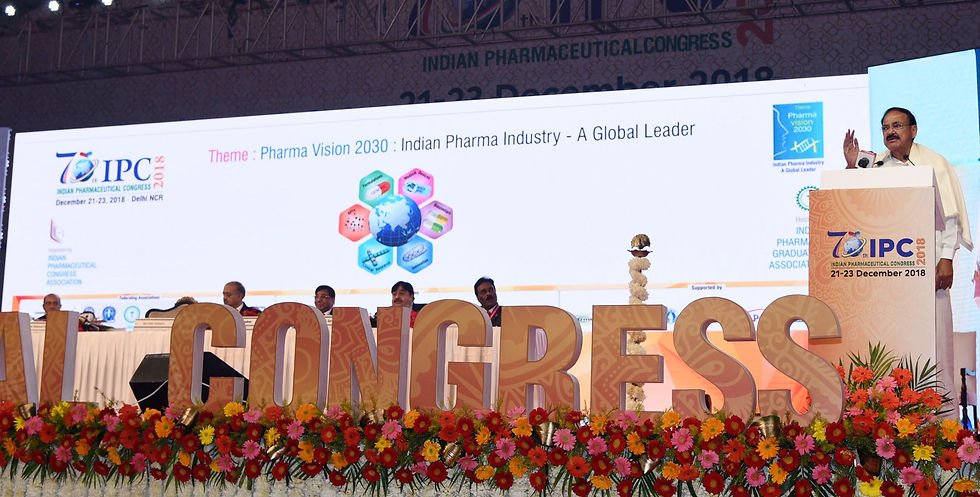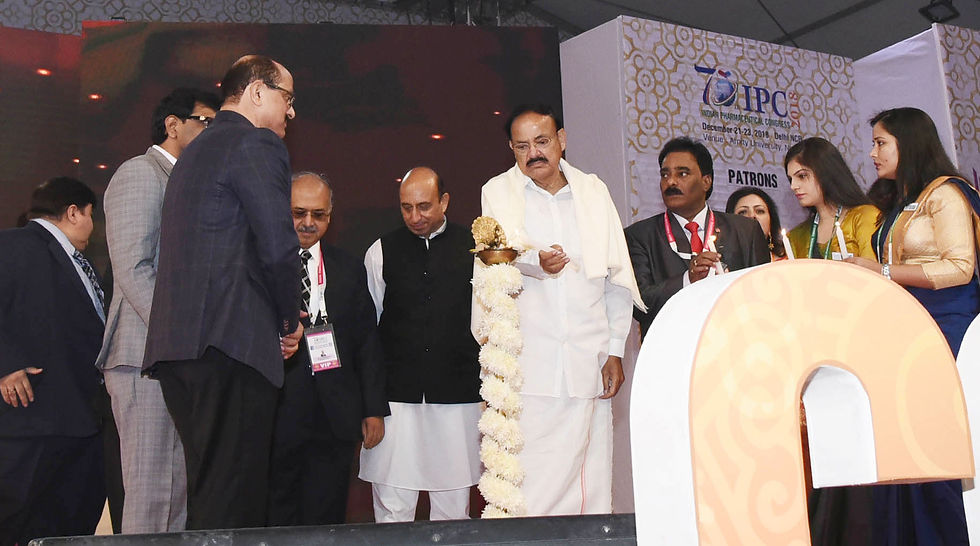Make India the international capital for Generic Medicines: Vice President
- Sanjay Trivedi
- Dec 22, 2018
- 8 min read
The Vice President of India, Shri M. Venkaiah Naidu has called up on the pharmaceutical industry to work towards making India an International Capital of Generic Medicines.
Addressing the 70th Indian Pharmaceutical Congress at Amity University, Noida today, Shri Naidu said that India becoming the largest provider of generic drugs globally with the Indian generics accounting for 20 % of global exports in terms of volume was an eloquent testimony to the competence of the Indian pharma sector in terms of quality and pricing.
The Vice President said that apart from being the world leader in generic medicines, India should promote Indian systems of Medicine. He asked young researchers to work towards standardizing and benchmarking Indian systems of medicine and establish the efficiency, validity and efficacy of these traditional medicines, using globally established experimental protocols.
The Vice President asked Pharma companies to go above and beyond their CSR mandates to provide life saving and other essential drugs to those who cannot afford them. He said that it was essential for a country like India to provide healthcare and medicines at affordable prices. In developing countries, India is rendering yeoman service by providing access to life saving medicines at affordable prices, he added.
Saying that pharmaceuticals was a priority area for Government, Shri Naidu stressed the need to further harness the potential of the sector by use of technology, innovation and research.
Healthcare and its allied industries being the fifth-largest employer among all sectors, the Vice President asked the industry to invest in skilling. Given the significance of highly educated and specialized scientists in the sector, skill development is crucial, he said. He asked for a constant coordination between government and Industry to remove disconnect between demand and supply of skilled manpower in pharmacy sector.
Shri Naidu said that National Skill Development Corporation which has identified more than 60 job roles for the pharmacy graduates and post graduates for consideration under the Pradhan Mantri Kaushal Vikas Yojna would aid the building of vocational and technical training framework, hasten skill up-gradation and encourage innovative thinking.
Earlier, Shri Naidu interacted with CEOs of all major Pharmaceutical companies ahead of the inaugural event of the conference which was attended by more than 5000 participants from across India.
The Minister for Excise and Liquor Prohibition, Uttar Pradesh, Shri Jai Parata Singh and several dignitaries from fields of medicine, pharmaceuticals and other were present on the occasion.







Following is the text of Vice President's address:
"I am delighted to be amongst such a distinguished assembly of Pharma Professionals. I am pleased to learn that more than 5000 participants from across India are attending this annual congress.
Friends,
India has undertaken a long and arduous, yet rewarding journey in Pharmacology, from the “Charak Samhita” of traditional Indian medicine system, to becoming the third largest drug manufacturer in the world, in terms of volume, in the field of modern medicine.
Addressing this august gathering reminds me of a shloka from the Charak Samhita which goes on to say that, ‘Indra expounded the immortal and sacred science of life, the Ayurveda which consisted of three principles, Hetu – causative factors of disease, Linga – symptomatology and Aushadha – knowledge of therapeutics, treatments and medicines’.
It is clear that since the ancient times India had a very systematic, scientific and rational approach to the treatment of diseases.
The Atharva veda is a treasure trove of knowledge and wisdom in the field of medicine. It is lauded as the earliest source of medical information in India. Ayurveda has been regarded as an upaveda or a subtext of the Atharvaveda.
The Mantras in these ancient texts contain a wealth of information regarding herbs, metals, medicines, diseases and treatments. They speak of the astounding properties and powers that herbs and plants possess to cure diseases.
Sisters and Brothers,
It is indeed gratifying to note that India has succesfully maintained its legacy of being a pioneer in the field of pharmacology and today India enjoys the exalted position of being the ‘Pharmacy to the world’.
The Pharma industry has posted a robust, double-digit growth over the last few years. The industry was worth US $36.7 Billion in 2017 and is projected to grow to US $55 Billion by 2020. It is quite heartening to note that the Pharma sector is out-performing most other sectors in achieving consistently high growth. India is now among the top five pharmaceutical emerging markets of the world.
India is the largest provider of generic drugs globally with the Indian generics accounting for 20 % of global exports in terms of volume.
Generic drugs export has been growing at a very impressive rate of around 24% per year for the last four years.
In 2012-13, India’s pharmaceutical exports stood at $14.7 billion. More than half of it went to western markets which have tight regulations and strong accountability mechanisms.
This is an eloquent testimony to the competence of the Indian pharma sector in terms of quality and pricing.
In developing countries, India is rendering yeoman service by providing access to life saving medcines at affordable prices.
Presently over 80 per cent of the antiretroviral drugs used globally to combat AIDS are supplied by Indian pharmaceutical firms.
Due to the ability of the Indian pharma companies to produce drugs at economical rates, the cost of HIV/AIDS treatment has gone down to $400 per year from $12,000 – a spectacular contribution to global healthcare.
India also has a large pool of talented scientists and engineers who have the potential to lead the industry ahead to greater heights.
We have the desire and capability to absorb new technologies in manufacturing. ‘Make in India’ is one of the key programmes launched by the government to boost the economy and the aim is to transform India into a global manufacturing hub.
The target is to increase the GDP contribution of manufacturing to 25 % by 2025. Pharmaceuticals is one of the fastest growing contributors to “Make in India” campaign since its inception.
Sisters and Brothers,
The Government of India has taken up a number of initiatives to create an ecosystem that fosters manufacturing and have identified a few key areas.
Pharmaceuticals is one of those priority areas. There is immense scope for technology, innovation and research in pharmaceuticals.
India already has the second highest number of US FDA approved facilities and labour costs in Indian are significantly lower than other manufacturing hubs.
The Union Budget 2017-18 shows an increase of 23% in the health expenditure that is likely to give further impetus to the pharma sector.
The government has proposed amendments to the Drugs and Cosmetics Rules to ensure availability of generic drugs at reasonable prices and to promote the use of generic medicines.
It has also introduced a range of fiscal incentives to promote domestic manufacturing, including the reduction of inverted duty structure and basic customs duty.
Drug patenting is significant in catalysing growth in the pharmaceutical sector.
India has always taken a bold and exemplary stand against blind patent protection that benefit global pharma giants.
This uncompromising stand has been demonstrated through the granting of compulsory licence in 2012 to an Indian manufacturer to produce a cancer drug, the patent for which was held by the German company Bayer. Bayer’s pricing had made the drug unaffordable to poor cancer patients in India, Africa and elsewhere.
The Supreme Court of India also upheld the 2006 decision of the Indian patent office that refused a patent for a mere incremental innovation to a Swiss Pharma major. The verdict disallowing patent protection caused an international uproar.
Providing essential drugs and medicines at cost-effective prices is the key focus of Department of Pharmaceuticals, Ministry of Chemicals and Fertilizers.
Under the National Pharmaceutical Pricing Policy, as on December 15, 2016, ceiling price of 853 formulations are under price control.
The fixation of ceiling prices on medicines has resulted in a total saving of USD 392 million since May 2014.
The government and the Pharma sector in unison have managed to effectively harness the power of Information technology to improve efficiency.
‘Pharma Jan Samadhan’, a customer grievances redressal system was launched and a mobile application – ‘Pharma Sahi Daam’ that provides real-time information to consumers on prices of Scheduled/Non-scheduled medicines has also been introduced.
Sisters and brothers,
Quality medicines at affordable prices are now available to the poor and disadvantaged through the “Pradhan Mantri Bhartiya Jan aushadhi Kendras”.
There are more than 700 medicines; more than 150 surgicals and consumables are available at affordable prices for all at more than 4000 ‘Jan Aushadi Kedras’ across the nation.
In a very proactive move, the Government of India is setting up an electronic platform to regulate the profusion of online pharmacies that are coming up, under a new policy, to stop any misuse due to easy availability.
Healthcare is the fifth-largest employer among all sectors, both in terms of direct and indirect employment. Given the significance of highly educated and specialized scientists in the sector, skill development is crucial.
The National Institute of Pharmaceutical Education and Research (NIPER) imparts quality education in the areas of pharmaceutical sciences.
07 NIPERs were approved till 2015, while 3 new NIPERs at Chhattisgarh, Maharashtra and Rajasthan were announced in 2016.
National Skill Development Coorporation has identified more than 60 job roles for the pharmacy graduates and post gradutes for consideration under the Pradhan Mantri Kaushal Vikas Yojna.
This would result in the removal of disconnect between demand and supply of skilled manpower. It would aid the building of vocational and technical training frameworks, hasten skill up-gradation and encourage innovative thinking.
Dear Sisters and Brothers,
It is my ambition that along with being the world leader in generic medicines, we should also promote Indian systems of Medicine.
I urge young researchers to work towards standardizing and benchmarking Indian systems of medicine. It is up to you to establish the efficiency, validity and efficacy of these traditional medicines, using globally established experimental protocols.
Speedy introduction of generic drugs into the market should remain in focus. Rural health programmes, lifesaving drugs and preventive vaccines should also receive attention from policy makers and Pharma companies alike.
There should be an unwavering commitment to high standards of quality in drug manufacturing and quality frameworks such as Good Manufacturing Practices should strictly be adhered to.
There should also be a thrust on research and innovation. New healthcare challenges are emerging every day, especially with the alarming rise in the number of non communicable and lifestyle diseases and cancers.
New molecules and new drugs will have to be discovered and treatment protocols will have to be continuously upgraded and updated.
All this will have to be achieved without compromising on the affordability of drugs. Pharmaceutical sector has the crucial responsibility of saving human lives.
Pharma companies should go above and beyond their CSR mandates to provide life saving and other essential drugs to those who cannot afford them.
India should also enter into international partnerships and agreements in the pharmaceutical sector so that we learn from the best and adopt the best protocols and practices.
The Government will also have to increase spending and widen the insurance net so that the exorbitant out of pocket expenditure incurred by the poor and needy is brought down.
I am happy to be amidst this galaxy of prominent figures in the field of Pharmaceuticals. I congratulate the organizers of this congress for making a good beginning in the direction of making India a Pharmaceutical hub by 2030.
My best wishes to all the participants to make the best possible use of this three days congress for their career and professional growth and contribute in making India a global leader in end-to-end drug manufacturing in consonance with the Government of India’s 'Pharma Vision 2020'.
Thank you. Jai Hind!"







Comments